Problem-solving therapy benefits depressed, cognitively impaired older adults
Reuters Health • The Doctor's Channel Daily Newscast
January 7, 2011 • Patient Education, Psychiatry & Mental Health, Reuters Health • The Doctor's Channel Newscast
NEW YORK (Reuters Health) – In older patients with major depression and executive dysfunction, modified problem-solving therapy is more effective than supportive therapy in reducing disability, new research shows.
And even though disability increased following the 12-week treatment period, patients treated with problem-solving therapy (PST) continued to do better than those treated with supportive therapy (ST) during 2 years’ follow-up, investigators report in the January Archives of General Psychiatry.
“Depression with executive dysfunction is an entity of great theoretical interest because at the biologic level, a number of structures of the cognitive control network are impaired,” lead researcher Dr. George S. Alexopoulos, from Weill Cornell Medical College in White Plains, New York, told Reuters Health.
It’s also a sizable problem, in which an estimated 40% of older patients with major depression have some degree of executive impairment, such as distractibility and difficulties in planning and decision-making. According to Dr. Alexopoulos, these patients tend to respond poorly to antidepressant medication. [
Last year, his group published research showing that PST was more likely than ST to reduce depression and to induce treatment response and remission in 221 subjects over age 59 with depression and executive impairment.
The current study involved the same subjects, recruited at Cornell and the University of California at San Francisco between 2002 and 2007 and randomized to PST (n = 110) or ST (n = 111). Average age was 73, and mean years of education was 15.3. According to the authors, severity of depression, disability, and executive function were in the mild to moderate range.
The primary outcome was disability according to the 12-item World Health Organization Disability Assessment schedule II (WHODAS II), which assesses “understanding and communicating, getting around, self-care, getting along with others, household and work activities, and participation in society.” On a scale of 1 to 100, higher scores indicate greater disability.
Baseline WHODAS II scores did not differ significantly between groups (mean 26.6). The report shows that improvement was similar in the first 6 weeks, but PST scored significantly lower thereafter.
Least squares means at 12 weeks were 21.56 for PST and 23.70 for ST, a difference equal to approximately one standard deviation of healthy elderly individuals. After adjusting for time period and treatment site, reduction in disability in the PST group exceeded that in the ST group by about 0.18 points were week.
Similar differences were noted at week 36: 23.42 in the PST group and 25.23 in the ST group
However, PST was most effective n patients with greater cognitive impairment and with more previous depressive episodes.
Dr. Alexopoulos noted that PST involves five steps: problem identification and definition, goal setting, generating multiple solutions (brain storming), evaluating pros and cons of each solution, and developing an action plan.
Psychotherapists with at least 5 years clinical experience were trained in PST during a two-day workshop and received ongoing supervision. The PST was modified to address the executive deficits, by simplifying the language and using “concrete” examples of problems and solutions.
ST, on the other hand, involved active listening and offering support focusing on participants’ problems and concerns.
The investigators theorize that PST was better at reducing disability “perhaps through skill development and behavioral activation.”
“I think this is a well-conducted trial, meeting all quality criteria for this kind of study, and the results are very important,” Dr. Pim Cuijpers from VU University Amsterdam, the Netherlands, told Reuters Health in an email. “These findings confirm the importance of psychotherapies in older adults with executive dysfunction, but also the importance of psychotherapies in general.”
“More research is needed, but I expect PST to be effective in many other depressed populations,” he added. Dr. Cuijpers did not participate in the study.
The study was funded by grants from the National Institute of Mental Health.
Arch Gen Psychiatry 2011;68:33-41.
And even though disability increased following the 12-week treatment period, patients treated with problem-solving therapy (PST) continued to do better than those treated with supportive therapy (ST) during 2 years’ follow-up, investigators report in the January Archives of General Psychiatry.
“Depression with executive dysfunction is an entity of great theoretical interest because at the biologic level, a number of structures of the cognitive control network are impaired,” lead researcher Dr. George S. Alexopoulos, from Weill Cornell Medical College in White Plains, New York, told Reuters Health.
It’s also a sizable problem, in which an estimated 40% of older patients with major depression have some degree of executive impairment, such as distractibility and difficulties in planning and decision-making. According to Dr. Alexopoulos, these patients tend to respond poorly to antidepressant medication. [
Last year, his group published research showing that PST was more likely than ST to reduce depression and to induce treatment response and remission in 221 subjects over age 59 with depression and executive impairment.
The current study involved the same subjects, recruited at Cornell and the University of California at San Francisco between 2002 and 2007 and randomized to PST (n = 110) or ST (n = 111). Average age was 73, and mean years of education was 15.3. According to the authors, severity of depression, disability, and executive function were in the mild to moderate range.
The primary outcome was disability according to the 12-item World Health Organization Disability Assessment schedule II (WHODAS II), which assesses “understanding and communicating, getting around, self-care, getting along with others, household and work activities, and participation in society.” On a scale of 1 to 100, higher scores indicate greater disability.
Baseline WHODAS II scores did not differ significantly between groups (mean 26.6). The report shows that improvement was similar in the first 6 weeks, but PST scored significantly lower thereafter.
Least squares means at 12 weeks were 21.56 for PST and 23.70 for ST, a difference equal to approximately one standard deviation of healthy elderly individuals. After adjusting for time period and treatment site, reduction in disability in the PST group exceeded that in the ST group by about 0.18 points were week.
Similar differences were noted at week 36: 23.42 in the PST group and 25.23 in the ST group
However, PST was most effective n patients with greater cognitive impairment and with more previous depressive episodes.
Dr. Alexopoulos noted that PST involves five steps: problem identification and definition, goal setting, generating multiple solutions (brain storming), evaluating pros and cons of each solution, and developing an action plan.
Psychotherapists with at least 5 years clinical experience were trained in PST during a two-day workshop and received ongoing supervision. The PST was modified to address the executive deficits, by simplifying the language and using “concrete” examples of problems and solutions.
ST, on the other hand, involved active listening and offering support focusing on participants’ problems and concerns.
The investigators theorize that PST was better at reducing disability “perhaps through skill development and behavioral activation.”
“I think this is a well-conducted trial, meeting all quality criteria for this kind of study, and the results are very important,” Dr. Pim Cuijpers from VU University Amsterdam, the Netherlands, told Reuters Health in an email. “These findings confirm the importance of psychotherapies in older adults with executive dysfunction, but also the importance of psychotherapies in general.”
“More research is needed, but I expect PST to be effective in many other depressed populations,” he added. Dr. Cuijpers did not participate in the study.
The study was funded by grants from the National Institute of Mental Health.
Arch Gen Psychiatry 2011;68:33-41.









